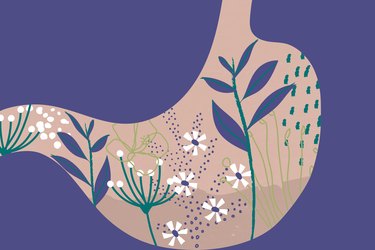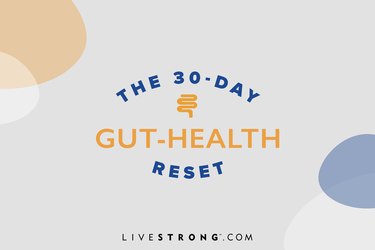
If you're feeling like you've only begun to understand the differences between prebiotics and probiotics, hang on to your seats because postbiotics have just crashed the party.
As gut health continues to be a hot topic in nutrition, here's what you need to know about the newest "biotic."
Video of the Day
Video of the Day
Probiotics vs. Prebiotics vs. Postbiotics
It's much easier to explain what a postbiotic is when you have some background on its partners in health: prebiotics and probiotics.
In terms of gut health, the goal is to have a diverse microbiota within the microbiome — which simply means that you want a lot of different types of bacteria populating your gut.
Probiotics
Probiotics are the living bacteria that you take in to increase the bacteria in your gut.
The official definition of a probiotic from the Food and Agriculture Organization is: "Live microorganisms which when administered in adequate amounts confer a health benefit on the host."
That means you need to gain a benefit from the live bacteria you are eating, otherwise, it can't be classified as a probiotic.
Prebiotics
So now that you know what a probiotic is, it's time to explain prebiotics. You have all of these amazing microorganisms helping out your gut and working to keep you healthy, you need to feed them. That's prebiotic — it's like food for your gut bacteria.
What do your gut bacteria like to eat? Fiber, and lots of it.
Postbiotics
Postbiotics are a new and emerging field of research, but when you have a prebiotic fueling the probiotic bacteria in your gut, the end of the metabolic process creates compounds called postbiotics.
"Postbiotics are made in our gut via the fermentation of prebiotic fiber by our commensal bacteria [the type that live in your gut]," says Heather Moday, MD, gut health expert, functional medicine physician and author of The Immunotype Breakthrough.
The International Scientific Association for Probiotics and Prebiotics defined postbiotics in 2019 as: "Preparation of inanimate microorganisms and/or their components that confers a health benefit on the host."
If the word "postbiotic" is broken down — "biotic" means either related to or something that has resulted from a living organism, whereas "post" simply means after. In looking at the meaning of the word and the definition, it's clear that a postbiotic is a non-living component that can benefit your health.
Probiotics are living, but prebiotics and postbiotics are not.
What Are Postbiotics Made Of?
In a nutshell, when you feed your gut bacteria, they reward you with the gift of postbiotics. Postbiotics are made of the compounds below, which are largely responsible for their health benefits:
- Short-chain fatty acids
- Exopolysaccharides
- Cell wall fragments
- Functional Proteins
- Vitamins
The Health Benefits of Postbiotics
When looking at the research on the potential health benefits of postbiotics, it's important to remember that this is a new field of research and the scientific community is just starting to begin to understand the scope of postbiotic potential.
The majority of the research into postbiotics has been done on the production of short-chain fatty acids (SCFA) and how they can improve health. The main SFCAs produced include:
- Butyrate
- Propionate
- Acetate
The most important postbiotic is the family of short-chain fatty acids, such as butyrate, that increases as you eat more fiber, Dr. Moday says. This is not to say that the other postbiotics produced are not important — only that the research needs to catch up with the hype.
1. They Might Reduce Overall Inflammation
Chronic inflammation, the kind that sticks around in the body for a long time, is not good for your health. It's tied to a myriad of health conditions, such as obesity, type 2 diabetes and cancer.
Research shows that a wide variety of postbiotics lead to lower inflammation, and postbiotics are a promising intervention for those with larger and longer inflammatory responses, according to a December 2021 review in the International Journal of Molecular Sciences.
The SCFA propionate has been shown to help reduce inflammation and may have anti-cancer potential, according to an August 2020 review in Nutrients. Plus, SCFAs are linked to protecting against human airway inflammation, which might help manage or treat asthma, according to February 2020 research in Immunity.
2. They're Linked to Helping Manage Gut Conditions
"Postbiotics can be especially good for your gut health and keeping the gut barrier strong," says gut health specialist Amanda Sauceda, RD.
Dietitian Vandana Sheth, RDN, agrees: "Postbiotics may help those with irritable bowel syndrome improve their quality of life, decrease symptoms such as bloating, pain and frequency of bowel movements."
It's thought that postbiotics, particularly butyrate, have the potential to help those with inflammatory bowel conditions, such as ulcerative colitis.
Ongoing research on these conditions is looking at how balancing the gut bacteria may help, and if postbiotics have any benefit. In order to produce the correct postbiotics to help a condition, you must have the right balance of microbes in your gut, per a November 2021 study in the Journal of Inflammation Research.
3. They Can Support Immunity
Much of how your immune system acts and responds is a direct reflection of the health of your gut. "Some studies have shown that postbiotics may help improve immunity and the ability to fight infections such as colds in adults," Sheth says.
Many studies suggest that SCFAs play a key role in improving the immune response. This is most notably due to their effect on the inflammatory processes in the body, in addition to their role in inhibiting pathogen growth, according to October 2020 research in Microorganisms.
This reduced inflammation that contributes to better immunity may also be responsible for the positive effects that lab research is seeing on fighting cancer cells, per a November 2021 study in Microbial Cell Factories.
In a study looking specifically at immunity in older folks, research points to a growing body of evidence to suggest supplementing with pre-, pro- and postbiotics may help to enhance the effectiveness of vaccines, according to a February 2021 study in Vaccines.
4. They May Be Linked to a Lower Risk of Food Allergies
Dr. Moday and Sheth both agree that postbiotics may have an influence on allergies.
A June 2020 review in Children looked at how the microbiome in the gut can affect food allergies and found that SCFAs produced in the gut may play a role in the development and treatment of food allergies.
Considering many food allergies develop in early childhood, it only makes sense that most of the research surrounding this topic is focused on infants and kids. A May 2021 review in Foods shows a link between butyrate, a healthy microbiome early in life and a lower risk of developing food allergies.
Do Postbiotics Have Any Drawbacks?
Postbiotics are produced naturally in your body, and there aren't any significant drawbacks.
"We're seeing the tremendous benefits that these metabolic byproducts have to gut and immune health, with almost no contraindications," Dr. Moday reassures.
How to Get More Postbiotics
Both Dr. Moday and Sauceda agree that getting postbiotics through food is the best strategy.
"Ideally, you want to set your gut up to create postbiotics for you by adding fermented foods and prebiotic fiber first, and then adding in postbiotic supplements if there's a need," Dr. Moday says.
"There are some postbiotics that are killed strains of bacteria that are not actually created in the gut — these are only available through supplementation and can give an added immune advantage."
Here's how to up your natural production of postbiotics:
1. Eat More Prebiotic Fiber
All prebiotics contain fiber, but not all fibers are prebiotic. Some foods contain fibers that are selectively fermented by specific bacteria in the gut, which help produce postbiotic byproducts and health benefits.
Prebiotic fiber-rich foods include:
- Onions, Garlic, Leeks
- Beans, lentils, peas
- Bananas
- Asparagus
- Oats
- Barley
- Soybeans
Tip
Sauceda recommends increasing your fiber slowly. "Your gut doesn’t like change, so adding fiber slowly helps your gut get more acclimated." You'll also want to drink more water to help keep things moving.
2. Eat More Probiotics
Introducing more fermented foods into your diet or diversifying your gut is also a smart strategy. Reach for these probiotic foods:
- Kimchi
- Sauerkraut (refrigerated)
- Kombucha
- Tempeh
- Miso
- Yogurt with live, active cultures
3. Take a Postbiotic Supplement
Postbiotic supplements aren't all that popular in the U.S., and the research surrounding their efficacy isn't too strong.
Still, Dr. Moday says that supplements may provide an advantage in multiple ways: "Postbiotics supplements are shelf-stable, not requiring refrigeration compared to live prebiotics which is an advantage. They are also very well-tolerated. Some people do not tolerate excess prebiotics or certain probiotics but can take postbiotics without GI distress."
Worth noting: Some baby formula is fortified with postbiotics to give the benefit without the necessity of live cultures, per an April 2022 review in Foods. Plus, current research is looking at how postbiotics might be an alternative to probiotics for people with severe illness or a compromised immune system, Sauceda says.
Tip
If you're considering a postbiotic supplement, Dr. Moday offers some sound advice: "Do your research on postbiotic supplements — make sure your supplement has published data on their product along with third-party testing for purity and potency."
And talk with your doctor before starting a postbiotic supplement, especially if you have digestive issues. Each person is different, and postbiotics may not be the answer for everyone, Sauceda says.
So Are Postbiotics Really the Key to Good Health?
It's too soon to know if postbiotics can cure what ails your gut.
One thing is certain, though: Eating a diet that is rich in prebiotic fiber with a variety of probiotic foods can be beneficial to your overall health, including your gut. Research is just a little shaky on specifics around postbiotics right now.
- Nature Reviews: "The International Scientific Association of Probiotics and Prebiotics (ISAPP) consensus statement on the definition and scope of postbiotics"
- FAO: "Probiotics in Food"
- Foods: "The Concept of Postbiotics"
- Nutrients: "Postbiotics—A Step Beyond Pre- and Probiotics"
- Vaccines: "Exploring the Effect of Probiotics, Prebiotics, and Postbiotics in Strengthening Immune Activity in the Elderly"
- Journal of Inflammation Research: "The Immunomodulatory Functions of Butyrate"
- Children: "The Role of the Microbiome in Food Allergy: A Review"
- Immunity: "The Role of Lung and Gut Microbiota in the Pathology of Asthma"
- Microorganisms: "Gut Microbiota and Immune System Interactions"
- Harvard Health Publishing: "Healthy Gut, Healthy Heart?"
- Foods: "Butyrate: A Link between Early Life Nutrition and Gut Microbiome in the Development of Food Allergy"
- International Journal of Molecular Sciences: "Molecular and Cellular Mechanisms Influenced by Postbiotics"
- Microbial Cell Factories: "Anti-cancer and anti-inflammatory effects elicited by short chain fatty acids produced by Escherichia coli isolated from healthy human gut microbiota"


